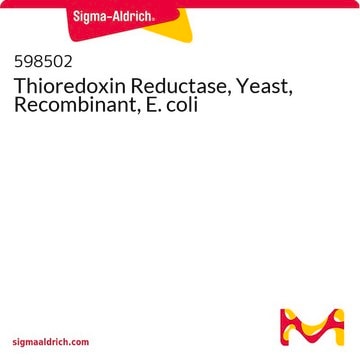Alle Fotos(2)
Wichtige Dokumente
CS0170
Thioredoxin Reductase Assay Kit
1 kit sufficient for 100 assays (1 mL)
Synonym(e):
Thioredoxin Reductase Activity Kit
Anmeldenzur Ansicht organisationsspezifischer und vertraglich vereinbarter Preise
Alle Fotos(2)
About This Item
UNSPSC-Code:
12161503
NACRES:
NA.84
Empfohlene Produkte
Qualitätsniveau
Verwendung
kit sufficient for 100 assays (1 mL)
Versandbedingung
dry ice
Lagertemp.
−20°C
Angaben zum Gen
human ... TXNRD1(7296) , TXNRD2(10587) , TXNRD3(114112)
Verwandte Kategorien
Allgemeine Beschreibung
The Thioredoxin Reductase Assay Kit uses a colorimetric assay for the determination of thioredoxin reductase activity in mammalian cells and tissues. It is based on the reduction of 5,5′-dithiobis(2-nitrobenzoic) acid (DTNB) with NADPH to 5-thio-2-nitrobenzoic acid (TNB) that produces a strong yellow color that is measured at 412 nm.
DTNB + NADPH + H+ ↔ 2 TNB + NADP+
DTNB + NADPH + H+ ↔ 2 TNB + NADP+
Anwendung
Using post nuclear extracts of rat liver, the kit shows linearity up to 0.25 units per mL. In this preparation, ~20% of the activity is due to non-specific reductase activity (refractory to the TrxR inhibitor).
Leistungsmerkmale und Vorteile
- An easy and simple method
- The kit contains all the reagents required for a colorimetric assay of mammalian thioredoxin reductase
- The kit includes an inhibitor solution for specific inhibition of mammalian thioredoxin reductase
- The kit has been tested with heart muscle, as well as lysates from cell lines such as HeLa, A549, Jurkat, U937, A431, COS, CHO, and NIH 3T3 cells
Nur Kit-Komponenten
Produkt-Nr.
Beschreibung
- Assay Buffer 5x for Thioredoxin Reductase 30 mL
- Thioredoxin Reductase 10 μg
- Thioredoxin Reductase Inhibitor Solution .05 mL
- 5,5'-Dithiobis(2-nitrobenzoic) acid (DNTB) 150 mg
- NADPH 25 mg
- Dimethyl Sulfoxide (DMSO) 7.5 mL
Signalwort
Warning
H-Sätze
Gefahreneinstufungen
Repr. 2
Lagerklassenschlüssel
10 - Combustible liquids
Flammpunkt (°F)
188.6 °F
Flammpunkt (°C)
87 °C
Hier finden Sie alle aktuellen Versionen:
Analysenzertifikate (COA)
Lot/Batch Number
Die passende Version wird nicht angezeigt?
Wenn Sie eine bestimmte Version benötigen, können Sie anhand der Lot- oder Chargennummer nach einem spezifischen Zertifikat suchen.
Besitzen Sie dieses Produkt bereits?
In der Dokumentenbibliothek finden Sie die Dokumentation zu den Produkten, die Sie kürzlich erworben haben.
Kunden haben sich ebenfalls angesehen
Iwona Jarocka-Karpowicz et al.
Biomolecules, 10(3) (2020-03-04)
Psoriasis is a chronic inflammatory skin disease characterized by dysregulated keratinocyte differentiation, but oxidative stress also plays an important role in the pathogenesis of this disease. Here, we examined the effect of cannabidiol (CBD), a phytocannabinoid with antioxidant and anti-inflammatory
Giulia Gorini et al.
Biomedicines, 9(8) (2021-08-28)
Au2phen ((2,9-dimethyl-1,10-phenanthroline)2Au2(µ-O)2)(PF6)2 and Auoxo6 ((6,6'-dimethyl-2,2'-bipyridine)2Au2(µ-O)2)(PF6)2 are two structurally related gold(III) complexes that were previously reported to display relevant and promising anticancer properties in vitro toward a large number of human cancer cell lines. To expand the knowledge on the molecular
Ida Landini et al.
Journal of inorganic biochemistry, 208, 111079-111079 (2020-06-05)
The antiproliferative properties of a series of structurally-related gold(I) and silver(I) linear complexes inspired to the clinically established gold-based drug auranofin were investigated in A2780 ovarian cancer cells and in their auranofin (A2780/AF-R) and cisplatin (A2780/CDDP-R) resistant counterparts. In A2780
Francesca Magherini et al.
Oncotarget, 9(46), 28042-28068 (2018-07-03)
Au(NHC) and Au(NHC)2, i.e. a monocarbene gold(I) complex and the corresponding bis(carbene) complex, are two structurally related compounds, endowed with cytotoxic properties against several cancer cell lines. Herein, we explore the molecular and cellular mechanisms at the basis of their
Melissa A Fath et al.
Clinical cancer research : an official journal of the American Association for Cancer Research, 17(19), 6206-6217 (2011-08-17)
Cancer cells (relative to normal cells) show increased steady-state levels of hydroperoxides that are compensated by increased glucose and hydroperoxide metabolism. The current study determined whether inhibitors of glucose and hydroperoxide metabolism could induce chemoradiosensitization by enhancing oxidative stress in
Unser Team von Wissenschaftlern verfügt über Erfahrung in allen Forschungsbereichen einschließlich Life Science, Materialwissenschaften, chemischer Synthese, Chromatographie, Analytik und vielen mehr..
Setzen Sie sich mit dem technischen Dienst in Verbindung.












